 Some researchers believe local prevention could be the key to controlling zoonoses, infectious diseases that can be transmitted from animals to humans or humans to animals. That’s why the Farm Foundation has organized a Sept. 23-24 symposium, titled “Zoonoses: Understanding the Animal Agriculture and Human Health Connection” at the Grand Hyatt Hotel, Washington, D.C.
Some researchers believe local prevention could be the key to controlling zoonoses, infectious diseases that can be transmitted from animals to humans or humans to animals. That’s why the Farm Foundation has organized a Sept. 23-24 symposium, titled “Zoonoses: Understanding the Animal Agriculture and Human Health Connection” at the Grand Hyatt Hotel, Washington, D.C.
Creating community environments in which zoonoses have difficulty surviving is a critical yet often overlooked factor in controlling these transmissible diseases shared between animals and humans. “Resources are often focused on studying specific disease threats. Yet there are social conditions, which, if left unaddressed, can greatly impact animal and human health,” explains Dr. Bonnie Buntain, a professor of public health at the University of Calgary.
Buntain is among the international experts from multiple disciplines who will examine the interrelationships of zoonoses, animal agriculture and human health…
While it is important to address specific disease threats, Buntain places equal importance on the need to prevent opportunities for zoonotic diseases to thrive. “We must work together to understand the social roots of ill health in certain populations and their animals. There are social conditions that result in the inability of certain populations to have access to adequate animal or human health care. These conditions exist even locally, in our own backyards, with needy or disadvantaged people,” Buntain explains. “If the health needs of these populations are not addressed, the impacts on animal and human health are often higher rates of disease and death. We have a social responsibility to address these issues.”
You can register for the conference … $300 if paid by Sept. 1, 2010, after that the fee will be $350 and a special student registration rate of $175 is also available if paid by Sept.1, after which it will be $200 … by going to the Farm Foundation website.
They’ve also reserved a block of rooms at a special symposium rate of $209 a night (good through August 25) at the Grand Hyatt Hotel, 1000 H Street NW, Washington, D.C. Contact the hotel at (202) 582-1234 for reservations and more information.
 The National Agri-Marketing Association will be holding it’s fall Trends In Agriculture conference in Minneapolis, MN this year. Perhaps you’re wondering why it’s not in Kansas City adjacent to the NAFB convention. I was. So I spoke with Jenny Pickett, NAMA CEO, and found out the answer.
The National Agri-Marketing Association will be holding it’s fall Trends In Agriculture conference in Minneapolis, MN this year. Perhaps you’re wondering why it’s not in Kansas City adjacent to the NAFB convention. I was. So I spoke with Jenny Pickett, NAMA CEO, and found out the answer.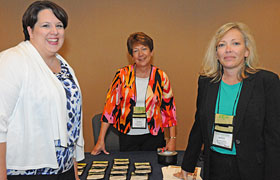 Jenny, pictured right at last week’s Boot Camp, says the reason NAMA had to move the Trends In Ag Conf. was due to being unable to book rooms at the Hyatt Crown Center. Apparently another conference was booked there from five years ago. So the NAMA board chose to move to dates that wouldn’t interfere with the NAFB Convention and to a location with a strong local NAMA chapter. So that’s the story. ZimmCast 271
Jenny, pictured right at last week’s Boot Camp, says the reason NAMA had to move the Trends In Ag Conf. was due to being unable to book rooms at the Hyatt Crown Center. Apparently another conference was booked there from five years ago. So the NAMA board chose to move to dates that wouldn’t interfere with the NAFB Convention and to a location with a strong local NAMA chapter. So that’s the story. ZimmCast 271



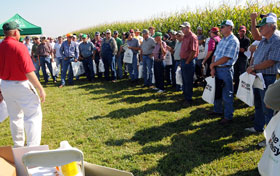 I have to believe that
I have to believe that  The
The 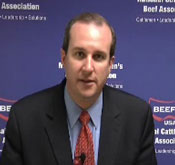 Colin says it is important for producers to not only read the rule, but to understand the implications and interpretation of it. “We’ve got a lot of
Colin says it is important for producers to not only read the rule, but to understand the implications and interpretation of it. “We’ve got a lot of  Have you cast your vote for your
Have you cast your vote for your  But your favorite market needs to be signed up for the contest in order for you to vote for them. I found that out today when I went to vote for our local Cole County (MO) Farmers Market, which sets up three times a week in the Kmart parking lot on Missouri Boulevard. I was pretty bummed to find out they were not in the running at all, since it is nice to visit them each week and get fresh, homegrown produce. I guess they would be in the “boutique” category, since they normally have less than 15 vendors.
But your favorite market needs to be signed up for the contest in order for you to vote for them. I found that out today when I went to vote for our local Cole County (MO) Farmers Market, which sets up three times a week in the Kmart parking lot on Missouri Boulevard. I was pretty bummed to find out they were not in the running at all, since it is nice to visit them each week and get fresh, homegrown produce. I guess they would be in the “boutique” category, since they normally have less than 15 vendors. 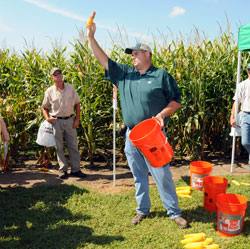 Not all corn comes out of the ear looking like you want it to. Sometimes there are factors affecting the kernel production that might yield some surprises. At the
Not all corn comes out of the ear looking like you want it to. Sometimes there are factors affecting the kernel production that might yield some surprises. At the 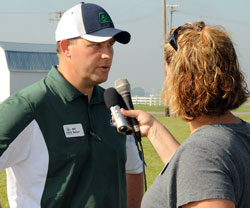 The media were very much in attendance at the
The media were very much in attendance at the 